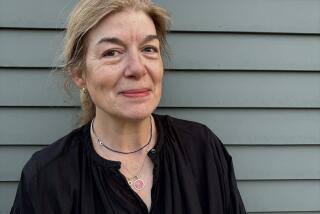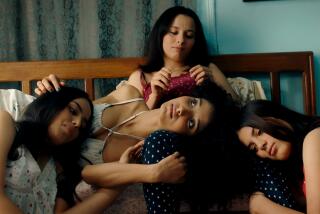Jihan Sadat: Between Two Worlds : From Across the Globe, a Woman of Egypt Deals With Her Husband’s Legacy
In the six years that have passed since assassins killed her husband as he was reviewing a military parade, life has changed utterly for Jihan Sadat, the former First Lady of Egypt.
Anwar Sadat is gone; her children and grandchildren are half a world away. Not quite a stranger in a foreign land, certainly not an expatriate in exile, she lives, nevertheless, in a country not her own, making only periodic visits to the family, friends and memories that are in Egypt.
“It’s not easy,” she said on a recent trip to Los Angeles, “but what am I going to do?
“I continue my life, enjoying it as much as I can, being an active person, doing something, working, teaching, lecturing. The best thing is to feel you are doing something.”
Approach to Life
Sadat, at 54, is not a morose, resentful woman talking about an unfair turn of fate. In conversation, she is serious, animated, pleasant, even stately at times but above all, she reveals a zest for life. Her words were no half-hearted comment but an explanation of what has been her approach to life.
Simon & Schuster has just published her autobiography, “Woman of Egypt,” and the book is, in essence, a description of one who has made the most of her circumstances. How Sadat chose to conduct herself as a Muslim Arab woman and wife of a revolutionary government official who becomes president is, if nothing else, the story of someone who believes in making a life for oneself.
It would be difficult to imagine passivity or defeat in anyone who writes and speaks so freely and unabashedly of destiny, vision, God’s will, mission and who seems so convinced that her husband and, at least by extension, herself were called to a great place in history. Sadat makes clear in her book and in the interview that she still has a two-fold mission: to do what she can to promote peace and to assure her husband’s place in history.
It was a promotion tour of the book that brought her to Los Angeles, and she pronounced herself happy to have taped several television interviews that would “travel for her” to 12 states.
“I love traveling,” she explained, “but especially when I know my daughter is there waiting for me with my two grandchildren, I want to go back.”
Back is to Virginia, to the house she bought near Washington several years ago, a place where her three daughters and one son, all married, occasionally visit with their families.
The life she has made for herself centers there. Although she has a doctoral degree from Cairo University in Arabic Literature and said she would love to teach in her field, she lectures on “women in a changing world” and teaches on the status of women in the developing world, especially Egypt.
“I feel it’s such a worthwhile thing to give a right idea about the society, tradition, culture to friends and the students here--whom I love so much.” She broke off momentarily, squeezing her hands and clutching them to her chest, as she spoke of the students. “So they can understand us more. This is itself a step for peace.”
Until she took a leave of absence to write her book, Sadat had been giving such courses at American University in Washington, Bradford University in Virginia and the University of South Carolina.
Clouded by Controversy
There was a brief controversy at the latter when some of the faculty, investigating the financial arrangements, protested that her fees and expenses were abnormally and unjustly high.
“I feel sad, definitely,” Sadat said of that controversy. “I withdrew. I don’t want any more difficulty with life. I am not going to answer any more lies.”
Controversy, however, is something she constantly faced in her former life. Attacks on Anwar Sadat and his legacy from Muslim fundamentalists and from the opposition in Egypt were predictable, as were criticisms about her very public role as First Lady and her crusade for women’s rights, she acknowledged.
Muslim fundamentalists felt she went too far and in too outrageous and immodest a fashion. Certain feminists, socialists and others said she didn’t go far enough and that she was in it for personal gain. She lived with the charges as First Lady. But some of the attacks on her husband’s regime after his death shocked her, she said, especially those coming from people who used to publicly praise him.
“They knew he was not going to be able to answer them back, so they came forward,” she said. “The lies. I couldn’t believe it. Really, if I didn’t have this faith in my husband, I wouldn’t have been able to bear it.”
Charges Remain
Nor have the charges ever gone away. To this day, the Sadats are accused of having lived extravagantly at government expense and of having amassed great personal wealth in money and property both in Egypt and abroad.
Sadat has not made it her mission to dispel the charges; she seldom comments on them and never in much detail, tending to dismiss them with “they love to tell such lies.”
When a caller spoke to her on a recent Michael Jackson radio talk show about the presumed extravagance, she fluctuated between sounding like an indulgent mother calming her child’s over-reactive imagination and an exasperated victim.
Later, in her hotel room, she blurted out again something she had said on the air.
“Give me a single thing, a single fact. It’s very easy to spread rumors but there is no such thing as a secret anymore in this world. Not here, not in our country, but they just love to say these things.”
When she was First Lady, she not only pressured her husband to promote family planning and the Personal Status Laws that made divorce more equitable for women, she often consciously sought to use her role to set an example, according to her book.
Thus, she went back to school at age 41, enrolling at Cairo University. She earned her bachelor’s degree, and defended her master’s thesis on live television.
“Jihan showing off,” her critics said.
“Jihan showing the women of Egypt they can do it,” Sadat herself explains.
Elected to Office
For similar reasons, she said, she ran for office and was elected to two very active terms on the Munufiyya Peoples Council, the province of her husband’s native village, Mit Abul-Kum.
She still sees herself as setting an example. This is the time when the Western world sees only setbacks for Muslim women and retreats from progress, setbacks that are real but exaggerated here, she said. At such a time, and in spite of the small government pension she is given, she presents herself as a widowed grandmother, on her own and self-supporting for the first time in her life.
“I’m not complaining. It was a challenge. I wanted to do it--teach, earn a living. I’m very proud of it. I have not asked any favor of anyone.”
She very definitely sees herself as having a mission. “That’s what gives me the strength. Otherwise, I would have rested at home in Giza in Cairo, having my friends. This is not the way I wish to continue. . . . I have the feeling I am giving the right image for the Egyptians, which I am very proud of. So Americans will understand us more.”
The rest of her mission has to do with her husband’s place in history. She continues to speak about him and his accomplishments as a visionary and man of peace wherever she goes.
And while she tends not to deal directly with his apparent and immediate fall from favor in Egypt, she insists he was loved and appreciated by the Egyptians.
That she is living outside of Egypt has much to do with her husband’s memory there, which she diplomatically dismisses by saying it is best she not live there “for a certain period.”
She was adamant, however, that she had not left Egypt: “This is my country, Egypt, which I would never leave.”
She returns every year for the anniversary of his death, Oct. 7, and said she has noticed with satisfaction that each year more Egyptians are at his tomb, “thousands of thousands of men and women coming to share with me these moments.”
In time, she said, she is certain Egypt will be ready to establish a museum for her husband that is in her dreams.
“I am dying to see something like that,” she said. “I’ve visited the Kennedy Center, the Johnson Library. I am dying to have something much smaller like that in my country, dying to have the new generation know what he did, not only for my country but for the whole world.”
She said she hoped the government would eventually sponsor such a project but acknowledged it was too early. “Not yet. Maybe later on. The financial situation right now--this is not the right time.”
In the meantime, she will keep busy. And keep the flame. She wrote quite emphatically that she would never remarry. She really meant it, she said.
“I’m saying never because I never thought it. It didn’t come into my mind. I don’t think someone like me who lived with Sadat, lived with him through his mission--we were like one person, enjoying this long life--it’s not that easy to start another life with another person. It’s not that easy at all for me.”
Having said it essentially from her point of view, a look of self-awareness and vague amusement crossed her face and she smiled.
“And who,” she asked wryly, “could bear me talking all the time about him?”
More to Read
Sign up for our Book Club newsletter
Get the latest news, events and more from the Los Angeles Times Book Club, and help us get L.A. reading and talking.
You may occasionally receive promotional content from the Los Angeles Times.








